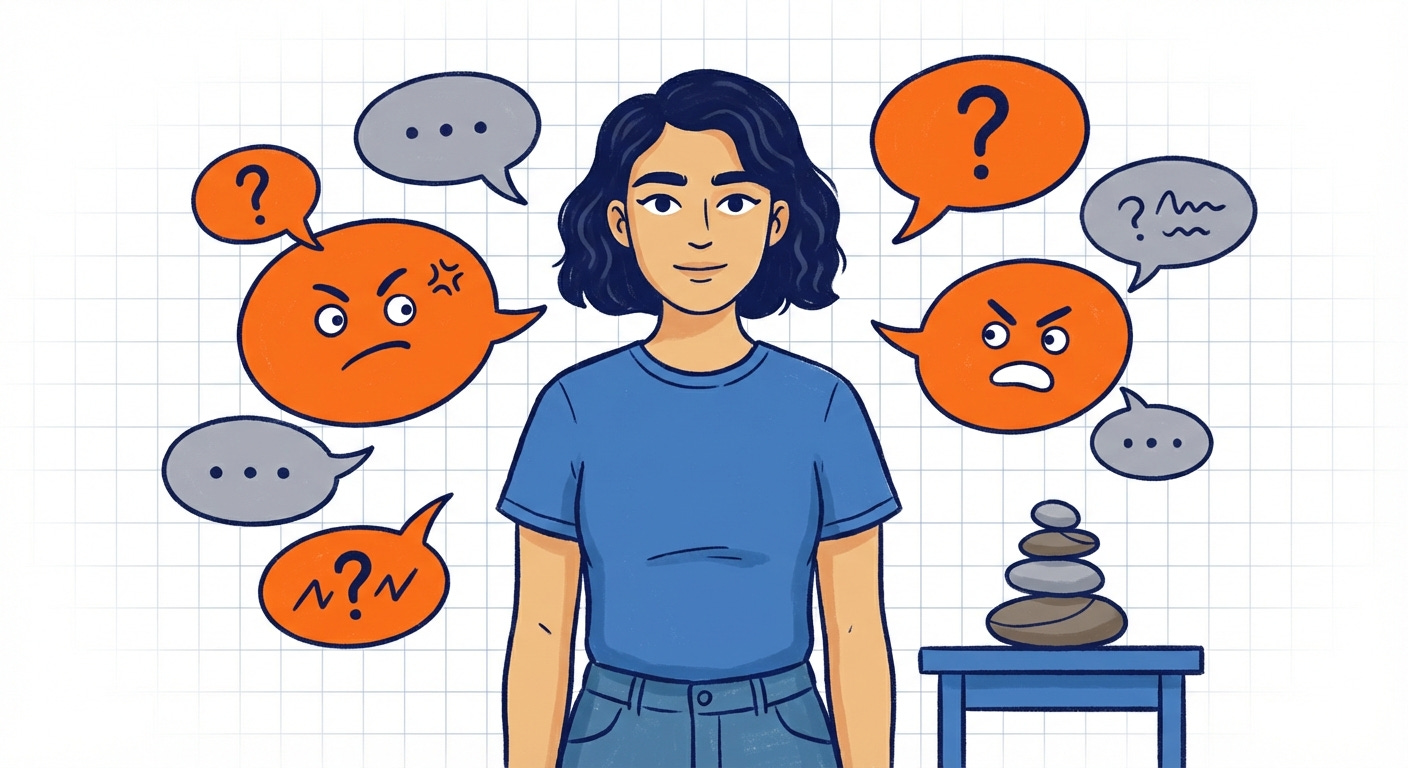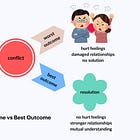5 Tips for Staying Kind, Calm, and Open During Difficult Conversations
Lessons in emotional intelligence - strengthening your emotional self-management
Hey, it’s Irina! 👋 Welcome to another edition of The Caring Techie Newsletter.
Continuing the Kindness At Work series, this week, you’ll learn practical advice to master your emotions and navigate difficult conversations. I’m sharing the 5 key strategies that helped me plus, a personal story to bring it all to life.
Read time: 7 minutes
My confession
I have a confession to make. There are moments in my earlier career I’m not proud of.
I remember with clarity one of them. A few of my teammates and I were visiting a remote office. During a whiteboard brainstorming session with some of the members of the partner team, I kept trying to make a suggestion. I couldn’t make myself heard because another coworker seemed to not want to listen to me and kept interrupting me.
I was younger and shyer. It took a lot more for me to assert myself, or set boundaries.I ended up bottling up my emotions so much, only to get so frustrated that I all of a sudden stormed out of the conference room, and spent 15 minutes in the bathroom to calm down.
My emotions felt out of control, so rather than lashing out at my coworker who kept interrupting me, in a split second I decided it was best if I removed myself from the situation. Was that the most mature thing I could’ve done? No. But it was the best I could do at the time.
Many years later, I found myself in a similar situation in a meeting that would emotionally trigger my younger self. That was the first time I felt a noticeable shift.
I remember sitting there and listening to this person talking while meta-thinking: “This person just said something that normally would annoy me and I’d get defensive. But I’m not feeling defensive yet. Interesting, well, since we’re here, what other options do I have other than to get angry and react?”. It was like somehow there was a time buffer between the trigger and the emotion when I could see the situation for what it was and decide differently.
So I didn’t get angry, nor did I leave the meeting room. I stayed calm, kind, and open.
What caused the shift? I had been practicing mindfulness, deliberately staying positive, and trying not to take things personally, which helped both personally and professionally.
I had a lot to gain from learning to stay present and engage in difficult conversations, there is a lot of growth that comes out of them, which is why this matters so much.
Why this matters
Conversations that could potentially become difficult are unavoidable. We see them anytime:
someone is disagreeing with us
someone is giving us difficult feedback
someone is delivering bad news or unfavorable information
someone is questioning our expertise or decisions
someone is sharing a message that triggers us emotionally
or
we’re disagreeing, giving difficult feedback, or delivering bad news
we’re asking for something uncomfortable (asking for a raise, more resources, or extra support)
we're negotiating conflicting interests or priorities
The emotions we experience are the main reason we tend to avoid these much-needed difficult conversations.
How we perceive these conversations varies from person to person. Some people might get emotionally flooded, and react visibly by crying or lashing out, with extreme cases resulting in a complete emotional meltdown. Others completely shut down as a defense mechanism. It’s all individual.
Regardless of how we react, our emotions and reactions are our responsibility. We cannot blame others for our emotional reactions. Part of building emotional intelligence is learning to self-regulate and bring our mind to baseline despite these triggers. If you want to learn how here are my 5 top tips:
Are you enjoying this article? Hit the ❤️ button or share it with a friend or coworker. 🙏🏻
1. Stay mindful and validate your emotions
Staying mindful means being aware of your thoughts and feelings without letting them take over. When we notice an emotion getting triggered, it is important to name and acknowledge it saying something like, "I'm feeling irritated right now” or “I’m feeling overwhelmed”. Label your experience without judging it.
The fact that you’re having an emotional reaction isn’t a bad thing, it’s a normal human thing. You can feel the feelings and still be in control of them.
Try this:
Give yourself permission to pause with, "I need a few minutes to cool off."
If you feel overwhelmed, remind yourself, "I’m doing my best, and it’s okay if I need time.”
Remind "It's okay to feel this way, but I won’t let it dictate my actions"
2. Breathe to calm down
Difficult conversations are called that for a reason: they feel emotionally challenging. When emotions run high, the part of our brains called the amygdala activates a fight-or-flight response.
An amygdala hijack occurs when the amygdala shuts down the connection to the rational part of the brain, disabling reasoned responses. If that happens, our emotions take control and this rarely leads to a productive outcome.
In these moments, self-regulation becomes crucial, and one of the best tools for this is focusing on your breath. Taking deep breaths can help shift you out of the fight-or-flight response and back into logical, prefrontal cortex-driven thinking.
Try this:
Pause before responding: Give yourself a few seconds to breathe and think before replying. It helps prevent impulsive reactions.
Inhale for four, exhale for six: Breathe in slowly through your nose for four seconds, then exhale through your mouth for six seconds. The slower exhale signals your body to relax.
3. Keep your internal dialogue positive
The way you talk to yourself during a difficult conversation has a huge impact on how you feel and react. If your internal dialogue is negative, you’ll end up feeling worse and possibly escalating the situation. Avoid riling yourself up further at all costs.
How you do that is by reframing your negative thoughts into positive alternatives. This will also help you maintain a positive external dialogue.
Try this:
Instead of thinking: “This is so frustrating,” try replacing it with, “I can handle this calmly.”
Remind yourself: “This isn’t the end of the world; I’ve dealt with tough situations before.”
4. Don’t take things personally
Whatever happens around you, don’t take it personally… Nothing other people do is because of you. It is because of themselves. All people live in their own dream, in their own mind; they are in a completely different world from the one we live in. When we take something personally, we make the assumption that they know what is in our world, and we try to impose our world on their world. - Don Miguel Ruiz, The Four Agreements
It’s easy to get worked up in a difficult conversation and feel like every comment is aimed at you. However, it's important to remind yourself, that most difficult conversations are not aimed at personally attacking anyone. The other person is there to solve the same problem just like you are.
Remember, people’s words and actions are a reflection of them, not of you. Keeping this in mind helps you stay grounded and not overpersonalize everything.
Try this:
Instead of “Why is this happening to me?”, remind yourself: “This conflict is about the issue, not me.”
Focus on the facts, not the people
Instead of internalizing someone else’s reaction, think, “Their response reflects their feelings, not my value.”
5. When they go low, you go high
This famous advice from Michelle Obama’s famous speech is all about taking the high road, even when others don’t. In difficult conversations, this means staying in integrity, even if the other person uses accusatory or petty language.
Just because someone else is being rude doesn’t mean you need to match their tone. Choosing to be kind and respectful allows you to stay focused on resolving the issue and keeps you from getting dragged into unproductive arguments.
Try this:
Speak slowly and clearly to help de-escalate the situation.
Focus on solutions by saying things like "Let's figure this out together."
Offer empathy by saying, "I can see that you're upset, and I want to understand how we can make this better."
Practicing these tips changed my life. Feeling in touch but still in control of your emotions and thriving in difficult conversations builds confidence and leads to incredible growth.
I would love to hear from you. What advice do you have for staying calm during difficult conversations?
Until next time,
Your Caring Techie
Are you enjoying this article? Hit the ❤️ button or share it with a friend or coworker. 🙏🏻
Do you want to work with me? Here are 3 ways I can help:
Book a one-hour call where we can tackle your most pressing issues.
Private coaching - I am opening a handful of coaching spots to work with me 1-1, email me at thecaringtechie@gmail.com or DM me to learn more!
Teaching private cohorts of “Impact through Influence”, if you’re a manager or leader interested in this for your teams, reach out!





Great advice. I also recommend a few minutes of meditation before going into a meeting that you suspect beforehand as one that will involve listening to or interacting with coworkers who often trigger such overflowing emotions. You can't change who they are but you can change how you react to them. Not easy, but worth the effort!
🥰 lovely. Thanks for sharing